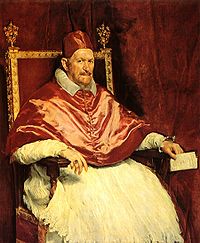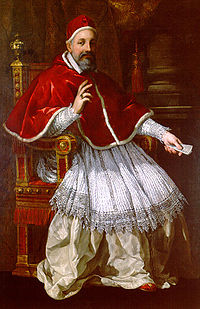- Papal conclave, 1644
-
 Giovanni Battista Pamphili, elected as Pope Innocent X.
Giovanni Battista Pamphili, elected as Pope Innocent X.
The papal conclave of 1644 was the papal conclave of Cardinals called on the death of Pope Urban VIII. It lasted from 9 August to 15 September 1644 and eventually chose Giovanni Battista Pamphili, who took office as Pope Innocent X.
Contents
History
Urban's influence
The reign of Pope Urban VIII (which included the costly First War of Castro) had been financially troubling for Rome and for the Church and the ongoing conflict for control of the Church between Spain and France and the ongoing Thirty Years' War meant many cardinals arrived at the conclave seeking a compromise which would bring stability to the Church.
But Urban's reign had also subjected the Church to his notorious nepotism. He had appointed three family members as Cardinals; his brother Antonio Marcello Barberini and his two nephews, Francesco Barberini and Antonio Barberini. His nephews, especially, were keen to retain the wealth, power and property they had amassed during their uncle's reign and both sought to move the conclave in their favour.
They started by hiring, it was rumoured, bands of brigands and mercenaries to roam the streets of the city causing trouble, creating noise and generally making it uncomfortable for the cardinals inside the conclave.
Split conclave
Somewhat disingenuously, Francesco sided with the cardinals loyal to Spain. Urban VIII had been a strong francophile and the mood of the conclave was with Spain from the beginning. Antonio, at the direction of Cardinal Jules Mazarin, sided with the cardinals loyal to France and was supported with funding from the French with which he was to buy wavering votes.
So rather than working for consensus, the two brothers split the conclave. When voting started on 29 August, Antonio Barberini put Giulio Cesare Sacchetti forward as a candidate but without great success. The following day, Francesco Barberini nominated Giovanni Battista Pamphili with much the same result.
At a stand off, the brothers then sought to win each other over. Antonio Barberini had been moving about the conclave offer all form of incentives to the various cardinals, from official positions to cash. So Antonio offered a package of incentives to Spanish supporters in return for their vote in favour of Sacchetti. The deal was to be brokered by the recently arrived French Ambassador and would likely have been concluded had the ambassador not tried to slip advantageous clauses into the agreement when it came time for the brothers to agree. The new agreement signed 20,000 doubloons over to the ambassador and his family in return for acting as agent between the two parties. Antonio furiously withdrew the offer and broke off negotiations.
Pamphili elected
Though it's likely he didn't have to, Francesco Barberini countered with a generous offer from the Spanish delegation which included a promise of protection for the Barberini (including Francesco himself) from King Philip IV of Spain. Antonio and his delegation agreed and the following morning, on 15 September 1644, Pamphili was elected and took the papal throne as Pope Innocent X.
French reaction
Cardinal Mazarin had a back-up plan to exercise France's jus exclusivae against Pamphili's nomination and left for Rome but arrived too late to issue the veto. As it was, Spain's Cardinal Gil de Albornoz presented a veto against Sacchetti, putting the result beyond doubt.
Mazarin was furious and blamed the ambassador who in turn claimed Antonio Barberini had included the clause is his own agreement as an excuse for turning on the French and siding with the Spanish. Mazarin, keen to remain on good terms with the Barberini, recalled the ambassador and continued to support the Barberini. Mazarin later provided shelter for the Barberini nephews (including the cardinals' brother, Taddeo Barberini) after Innocent X had them investigated and exiled to Paris.
Furious at the power Innocent's election gave to his already-powerful sister-in-law, Olimpia Maidalchini, Cardinal Alessandro Bichi was said to have exclaimed, "We have just elected a female pope". Supporters of Bichi and the French delegation hung banners in churches calling her "Pope Olimpia I".
Participants
- Cardinal Dean: Marcello Lante della Rovere
- Sub-dean: Pier Paolo Crescenzi
- Giambattista Pamphili (Elected Pope Innocent X)
- Francesco Cennini de' Salamandri
- Guido Bentivoglio d'Aragona (Died on 7 September, during the conclave)
- Giulio Roma
- Luigi Capponi
- Gaspar de Borja y Velasco
- Alfonso de la Cueva-Benavides y Mendoza-Carrillo
- Antonio Marcello Barberini (brother of Pope Urban VIII)
- Ernst Adalbert von Harrach
- Bernardino Spada
- Federico Baldissera Bartolomeo Cornaro
- Giulio Cesare Sacchetti
- Giandomenico Spinola
- Gil Carrillo de Albornoz
- Alphonse-Louis du Plessis de Richelieu
- Giovanni Battista Maria Pallotta
- Ciriaco Rocci
- Cesare Monti
- Francesco Maria Brancaccio
- Alessandro Bichi
- Ulderico Carpegna
- Stefano Durazzo
- Marco Antonio Franciotti
- Francesco Maria Macchiavelli
- Ascanio Filomarino
- Marco Antonio Bragadin
- Pier Donato Cesi
- Girolamo Verospi
- Vincenzo Maculani
- Francesco Peretti di Montalto
- Giovanni Giacomo Panciroli
- Fausto Poli
- Lelio Falconieri
- Gaspare Mattei (Left the conclave due to illness)
- Cesare Facchinetti
- Girolamo Grimaldi-Cavalleroni
- Carlo Rossetti
- Giambattista Altieri
- Mario Theodoli
- Francesco Angelo Rapaccioli
- Francesco Adriano Ceva
- Angelo Giori
- Juan de Lugo y de Quiroga
- Carlo de' Medici
- Francesco Barberini (Cardinal-Nephew of Pope Urban VIII)
- Marzio Ginetti
- Antonio Barberini (Cardinal-Nephew of Pope Urban VIII)
- Girolamo Colonna
- Giangiacomo Teodoro Trivulzio
- Giulio Gabrielli (Left the conclave due to illness)
- Rinaldo d'Este
- Vincenzo Costaguti
- Giovanni Stefano Donghi
- Paolo Emilio Rondinini
- Achille d'Étampes de Valençay
Absent cardinals
- François de la Rochefoucald
- Baltasar Moscoso y Sandoval
- Agustín Spínola
- Jules Raymond Mazarin
- Virginio Orsini
Sources
- S. Miranda: Papal Conclave, 1644.
- The Triple Crown: An Account of the Papal Conclaves by Valérie Pirie.
- Catholic Hierarchy: Conclave - 1644.
- Ave Papa/Ave Papabile: the Sacchetti family, their art patronage, and political aspirations by Lilian H. Zirpolo (2005).
- Mistress of the Vatican by Eleanor Herman.
Holy See elections Pre-1059 Before 105911th century 12th century 13th century 14th century 15th century 16th century 17th century 18th century 19th century 20th century 21st century Categories:- Papal conclaves
- 17th-century Roman Catholicism
- 1644 in Europe
Wikimedia Foundation. 2010.


